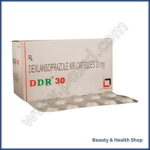ADDICTION
ALCOHOL DEPENDENCE
QUIT SMOKING
ALLERGY
ANTI FUNGAL
FUNGAL INFECTION
FUNGAL NAIL INFECTIONS
ANTI-REJECTION DRUGS
ANTI WORM
ANTIBIOTIC
BACTERIAL INFECTIONS
ARTHRITIS
GOUT
OSTEOARTHRITIS
RHEUMATOID ARTHRITIS
BLOOD
LOW PLATELET COUNT
THROMBOPHLEBITIS
VARICOSE VEINS
COLON
ANAL FISSURE
PILES
ULCERATIVE COLITIS
DIABETES CARE
DIABETES INSIPIDUS
DIABETES TYPE
DIABETIC FOOT ULCERS
GLUCOSE MONITOR
EYES/EAR CARE
DRY EYES
EYE CARE
EYE EXAMINATION
EYE INFECTION
EYE LASHES
EYE PAIN
GLAUCOMA
OCULAR HYPERTENSION
UVEITIS
FEVER CARE
MALARIA
RHEUMATIC FEVER
TYPHOID FEVER
GASTROINTESTINAL
ACIDITY
CONSTIPATION
CROHN'S DISEASE
DIARRHOEA
GALLBLADDER STONES
INTESTINAL ULCERS
IRRITABLE BOWEL SYNDROME
MOTION SICKNESS
NAUSEA
Ddr 30 mg (Dexlansoprazole)
| Active Ingredient (Generic Name): | Dexlansoprazole |
|---|---|
| Indication: | used in the treatment of gastroesophageal reflux disease |
| Manufacturer: | MSN Laboratories |
| Packaging: | 10 capsules in one strip |
| Strength: | 30 mg |
From: $25.00
If you’ve ever experienced acid-related disorders like GERD or erosive esophagitis, Ddr 30 mg (Dexlansoprazole) might be a familiar name. This medication plays an important role in managing stomach acid production, offering relief and promoting healing in specific conditions. But have you ever wondered about its mechanism of action and potential side effects? Stay tuned to uncover the essential details that can help you navigate the world of proton pump inhibitors and make informed decisions about your health.
Why is this medication prescribed?
Ddr 30 mg (Dexlansoprazole) is prescribed to reduce the amount of acid produced in the stomach. This medication belongs to a class of drugs known as proton pump inhibitors (PPIs). It is commonly used to treat conditions such as gastroesophageal reflux disease (GERD), erosive esophagitis, and other conditions where the stomach produces too much acid.
When you have GERD, the lower esophageal sphincter (LES) relaxes abnormally or weakens, allowing stomach acid to flow back up into the esophagus, causing symptoms like heartburn and irritation. Dexlansoprazole works by blocking the enzyme in the wall of the stomach that produces acid, thereby decreasing the amount of acid produced.
How should this medicine be used?
To properly use Ddr 30 mg (Dexlansoprazole), follow the dosage instructions provided by your healthcare provider. Typically, this medication is taken once a day, preferably in the morning, with or without food. Swallow the capsule whole; do not crush, chew, or split it. If you have difficulty swallowing the capsule, you can open it and sprinkle the contents on a tablespoon of applesauce, ensuring you swallow it immediately without chewing. It’s essential to take Ddr 30 mg at the same time each day to maintain consistent levels of the medication in your body. Remember to continue taking this medication for the prescribed duration, even if you start feeling better before the treatment is complete. If you miss a dose, take it as soon as you remember, unless it’s near the time for your next dose. Avoid doubling up on doses to make up for a missed one. If you have any questions about the usage of Ddr 30 mg, consult your healthcare provider for clarification.
Other uses for this medicine
If you have been prescribed Ddr 30 mg (Dexlansoprazole), it is important to note that this medication is primarily used for treating specific conditions; however, there may be other uses for this medicine as determined by your healthcare provider. Dexlansoprazole is mainly prescribed to manage conditions like gastroesophageal reflux disease (GERD) and erosive esophagitis. It works by reducing the amount of acid produced in the stomach, which helps alleviate symptoms associated with these conditions.
In addition to its primary uses, your healthcare provider may recommend Dexlansoprazole for other off-label uses. These could include conditions where reducing stomach acid production may be beneficial, such as in the treatment of stomach ulcers, Zollinger-Ellison syndrome, or other acid-related disorders. Your healthcare provider will assess your individual medical needs and determine if Dexlansoprazole is suitable for these alternative uses. It is essential to follow your provider’s instructions carefully and report any unexpected side effects or concerns during your treatment with Dexlansoprazole.
What special precautions should I follow?
When taking Ddr 30 mg (Dexlansoprazole), it is important to be aware of potential drug interactions. Always inform your healthcare provider about all the medications, supplements, and herbal products you are currently taking. This will help avoid any harmful interactions and guarantee the safe and effective use of Ddr 30 mg.
Potential Drug Interactions
Taking Ddr 30 mg (Dexlansoprazole) requires being cautious about potential interactions with other medications. To guarantee your safety and the effectiveness of your treatment, consider the following:
- Consult Your Healthcare Provider: Before starting Ddr 30 mg, inform your healthcare provider about all medications, supplements, and herbal products you are currently taking.
- Be Aware of Possible Interactions: Some medications, such as certain antibiotics, antifungals, and antidepressants, may interact with Ddr 30 mg, affecting its absorption or potency.
- Monitor for Adverse Effects: Watch out for any unusual symptoms or side effects when starting a new medication alongside Ddr 30 mg, and report them promptly to your healthcare provider.
- Follow Dosage Recommendations: Stick to the prescribed dosage of Ddr 30 mg and inform your healthcare provider if any changes are made to your medication regimen.
What special dietary instructions should I follow?
To maintain the effectiveness of Ddr 30 mg (Dexlansoprazole), it is important to adhere to specific dietary guidelines. Avoid consuming foods or beverages that can trigger acid reflux or worsen your condition, such as spicy foods, citrus fruits, fatty or fried foods, caffeine, and alcohol. These items can irritate the esophagus and increase stomach acid production, counteracting the benefits of Ddr 30 mg.
Instead, focus on a diet rich in fruits, vegetables, whole grains, and lean proteins. These foods can help maintain a healthy digestive system and reduce the likelihood of acid reflux symptoms. Eating smaller, more frequent meals throughout the day rather than large meals can also be beneficial in managing acid reflux.
Furthermore, it is advisable to avoid eating close to bedtime to prevent nighttime reflux. Give yourself at least 2-3 hours after eating before lying down to allow for proper digestion and reduce the risk of acid flowing back into the esophagus while you sleep. Following these dietary instructions can help optimize the effectiveness of Ddr 30 mg in managing your condition.
What should I do if I forget a dose?
If you forget to take a dose of Ddr 30 mg (Dexlansoprazole), what should you do next? It is important to try to take the missed dose as soon as you remember. However, if it is close to the time for your next scheduled dose, it is advisable to skip the missed dose and continue with your regular dosing schedule. Do not double up on doses to make up for the missed one, as this can increase the risk of side effects without providing additional benefit.
Consistency in taking your medication is vital for its effectiveness. If you frequently forget doses, consider setting up reminders on your phone or using a pill organizer to help you stay on track. If you have any concerns about missed doses or how to best manage your medication schedule, don’t hesitate to consult your healthcare provider for guidance. They can provide personalized advice based on your specific situation and help ensure you are using Ddr 30 mg (Dexlansoprazole) safely and effectively.
What side effects can this medication cause?
Ddr 30 mg (Dexlansoprazole) may cause some side effects that could persist or worsen over time. Certain side effects can be severe, and if you notice symptoms like those outlined in the next section, it’s essential to contact your doctor promptly. Be vigilant about any changes in how you feel while taking this medication.
Persistent or Worsening Side Effects
Persistent or worsening side effects from Ddr 30 mg, also known as Dexlansoprazole, can include prolonged diarrhea, severe stomach pain, or persistent headaches. If you experience any of these symptoms, it is important to consult your healthcare provider promptly. Here are some potential side effects to watch out for:
- Persistent diarrhea that lasts for an extended period.
- Severe stomach pain that does not improve with time.
- Headaches that persist or worsen over time.
- Unexplained fatigue or weakness that continues despite rest.
Monitoring these symptoms closely and seeking medical advice if they persist or worsen is vital for managing your health effectively.
Some side effects can be serious. If you experience any of the following symptoms, call your doctor immediately:
Serious side effects may occur while taking Ddr 30 mg (Dexlansoprazole), prompting you to contact your doctor immediately. If you experience any of the following symptoms, seek medical help promptly:
- Severe stomach pain
- Difficulty swallowing
- Persistent nausea or vomiting
- Unexplained weight loss
These symptoms could indicate potentially serious complications that require immediate medical attention. It is important not to overlook these signs and to consult your healthcare provider promptly to address any concerns and receive appropriate care. Your doctor will be able to evaluate your condition, provide guidance, and adjust your treatment plan if necessary to safeguard your well-being and safety.
What should I know about the storage and disposal of this medication?
When storing and disposing of Ddr 30 mg (Dexlansoprazole), make sure to keep it in a cool, dry place away from moisture and heat. Make certain that the medication is stored at room temperature between 68-77 degrees Fahrenheit (20-25 degrees Celsius). Avoid keeping it in the bathroom or kitchen where there are moisture and heat fluctuations. Always keep Ddr 30 mg in its original packaging or container to protect it from light. Remember to tightly close the lid after each use to prevent air or moisture from affecting the medication’s quality.
When it comes to disposing of Ddr 30 mg, do not flush it down the toilet or pour it down the drain unless instructed to do so. Instead, check with your pharmacist or local waste disposal company on the best way to dispose of unused or expired medications. They can provide guidance on proper disposal methods that are safe for the environment and prevent misuse of the medication. If in doubt, always consult a healthcare professional for advice on the correct disposal of Ddr 30 mg.
In case of an emergency/overdose
If an emergency situation arises or if you suspect an overdose of Ddr 30 mg (Dexlansoprazole), immediate action is essential to guarantee safety and seek immediate medical assistance. Contact emergency services or a poison control center right away. Be prepared to provide information such as the amount ingested, time of ingestion, and any symptoms the individual is experiencing. Do not wait for symptoms to worsen before seeking help.
While waiting for medical assistance, ensure the person remains conscious and breathing. If they are unconscious but breathing, place them in the recovery position. Do not induce vomiting unless instructed by medical professionals. Keep the medication packaging nearby to provide necessary information to healthcare providers.
Be aware of the potential symptoms of an overdose, which may include nausea, vomiting, stomach pain, drowsiness, and seizures. Monitor the individual closely and be ready to provide any necessary information to medical personnel. Taking quick action in case of an emergency or overdose is critical for ensuring the best possible outcome.
What other information should I know?
For additional important details, consider discussing possible drug interactions with your healthcare provider before taking Ddr 30 mg (Dexlansoprazole). It is vital to inform your healthcare provider about any other medications, supplements, or herbal products you are currently taking, as they may interact with Dexlansoprazole and affect its effectiveness or increase the risk of side effects. Certain medications like warfarin, digoxin, or ketoconazole may interact with Dexlansoprazole, emphasizing the significance of a thorough discussion with your healthcare provider.
Moreover, it is essential to follow the prescribed dosage and administration instructions provided by your healthcare provider or pharmacist strictly. Do not alter the dosage or stop taking Dexlansoprazole without consulting your healthcare provider first. Additionally, inform your healthcare provider about any known allergies or medical conditions you have before starting Dexlansoprazole to ensure its safety and effectiveness for you. If you experience any severe side effects or adverse reactions while taking Dexlansoprazole, seek immediate medical attention.
Brand names
Consider exploring the various brand names under which Ddr 30 mg (Dexlansoprazole) is marketed to gain a better understanding of the available options. Here are some common brand names for Dexlansoprazole:
| Brand Name | Manufacturer | Dosage Form |
|---|---|---|
| Dexilant | Takeda Pharmaceuticals | Capsule |
| Kapidex | Takeda Pharmaceuticals | Tablet |
| Solansoprazole | Sun Pharmaceutical Industries Ltd. | Capsule |
Each of these brand names may have specific formulations or variations in dosage forms. Consult your healthcare provider or pharmacist to determine which brand name and formulation are most suitable for your condition. Understanding the different brand names can help you make an informed decision when discussing treatment options with your healthcare provider.
Purchase Options for Dexlansoprazole
To explore purchase options for Dexlansoprazole, look into where you can easily acquire this medication. Dexlansoprazole is available for purchase both online and in physical pharmacies. Online pharmacies provide convenience and accessibility, allowing you to order Dexlansoprazole from the comfort of your own home. When purchasing online, make sure that you are using a reputable and licensed pharmacy to guarantee the authenticity and quality of the medication.
If you prefer to buy Dexlansoprazole in person, you can visit local pharmacies or drugstores. Simply visit the pharmacy counter and request Dexlansoprazole by name or brand. Pharmacists can assist you in finding the right dosage and provide additional information about the medication if needed. Remember to check for any available discounts or insurance coverage that may help reduce the cost of Dexlansoprazole.
Before making a purchase, consult with your healthcare provider to confirm that Dexlansoprazole is the right medication for your condition. Additionally, follow the prescribed dosage and usage instructions to maximize the effectiveness of Dexlansoprazole in managing your symptoms.
To summarise
Let’s wrap up the information by summarizing briefly. Dexlansoprazole, marketed as Ddr 30 mg, is a medication commonly used to treat conditions such as gastroesophageal reflux disease (GERD) and heartburn. It belongs to a class of drugs known as proton pump inhibitors (PPIs), which work by reducing the production of stomach acid. Dexlansoprazole is available in a delayed-release capsule formulation, ensuring the drug is released in the intestine where it is most effective. When taking Dexlansoprazole, it is important to follow the prescribed dosage and instructions provided by your healthcare provider to achieve the best results. Common side effects may include headache, diarrhea, and abdominal pain, but serious side effects are rare. It is essential to inform your doctor about any existing medical conditions or medications you are taking to avoid potential drug interactions. In conclusion, Dexlansoprazole is an effective treatment option for managing acid-related conditions when used as directed under medical supervision.









There are no reviews yet.